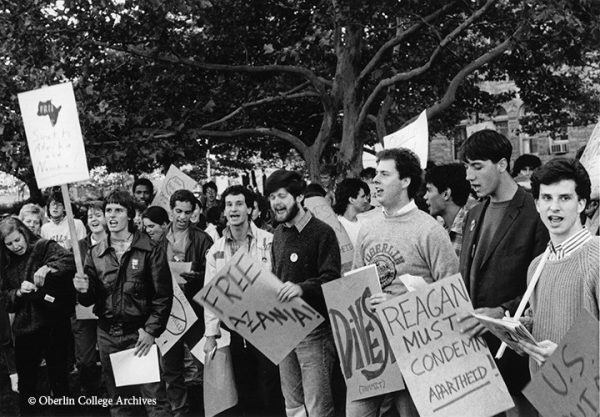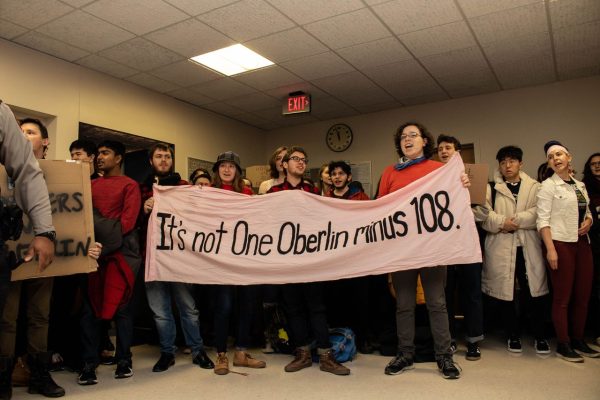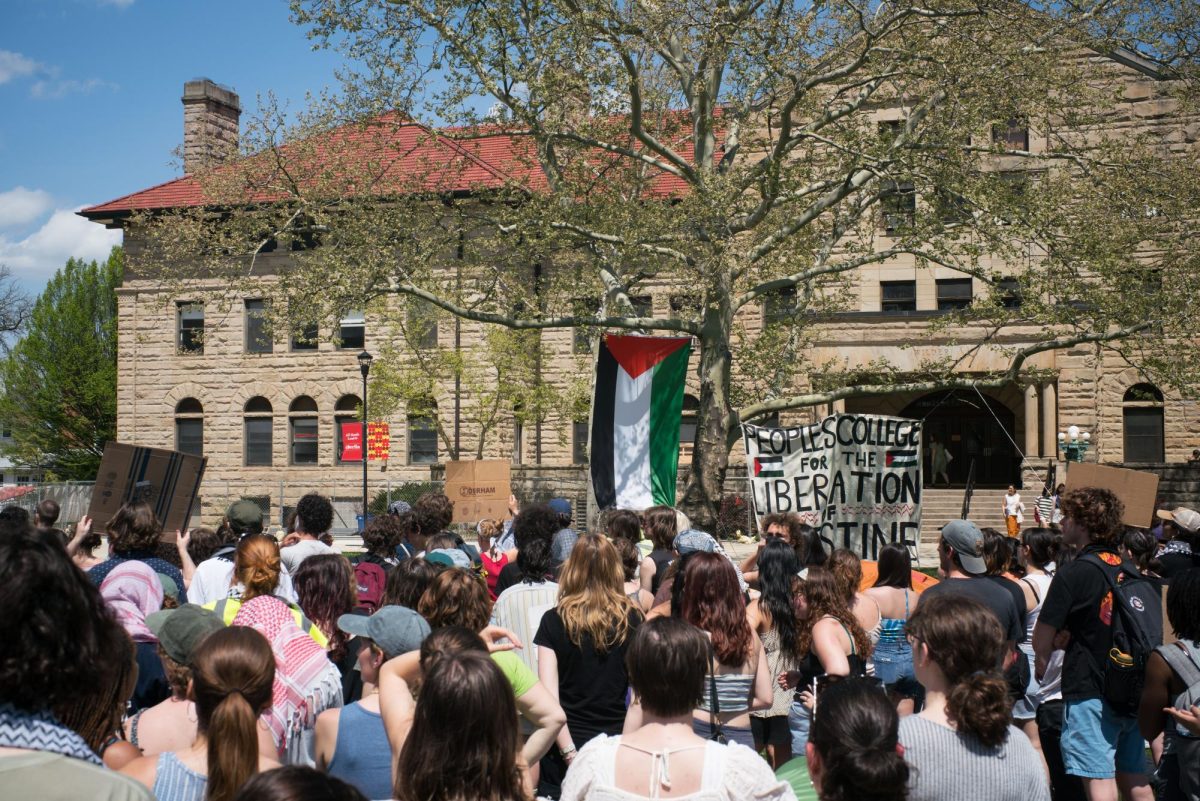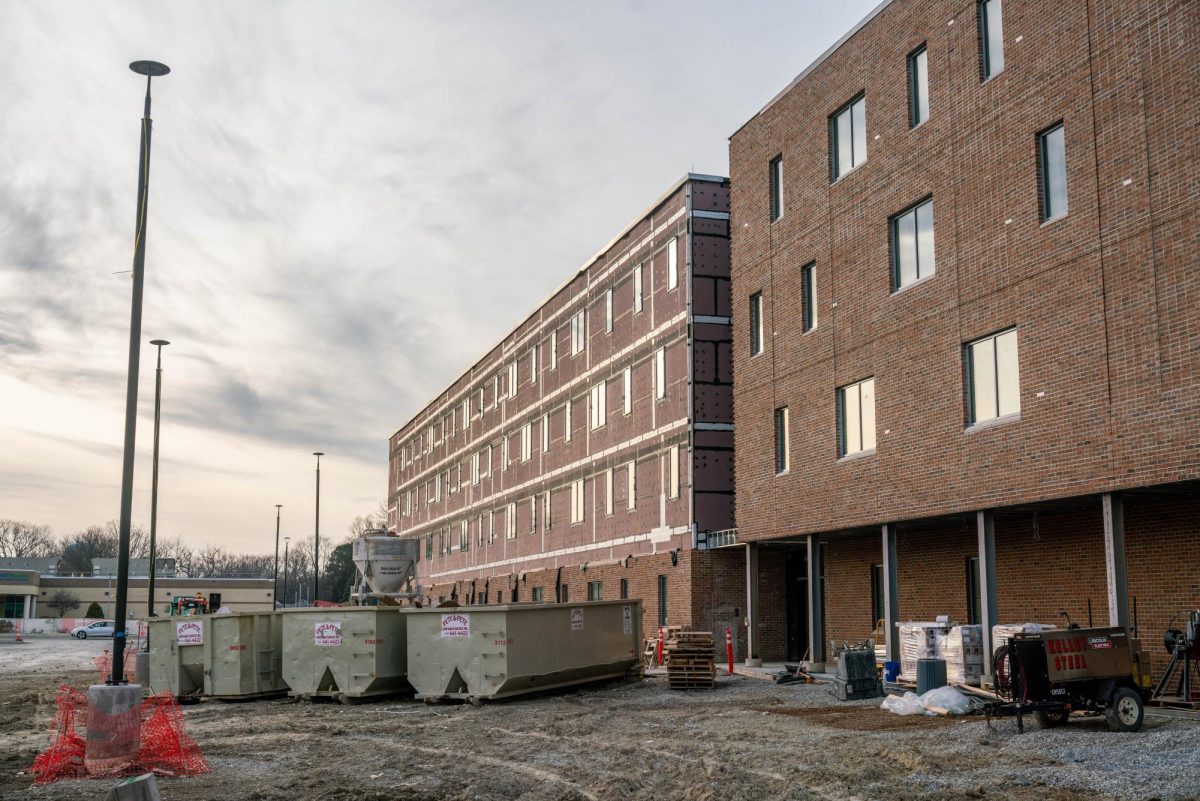On Wednesday, Sept. 12, the General Faculty discussed a proposal that would update rules regarding student protests. The revisions would add protests and demonstrations to the Guidelines for Meetings Involving Speakers, Films, and Other Forms of Artistic Expression and update rules regarding these activities. The General Faculty voted to push consideration of the proposal to their next meeting on Oct. 16, before which the College will revise the proposal, according to Associate Dean of Students Thom Julian.
Under the policy proposed at the September meeting, protests would not be allowed to make loud noises that “unreasonably” interfere with academic or workplace environments. Organizations sponsoring events or protests would be required to reserve rooms or spaces, and groups would not be allowed to hold protests in indoor public areas. The updated regulations also specify that all signs and distributed literature would have to adhere to Oberlin’s posting policy.
Among other edits, the new guidelines update the procedures in place if a speaker poses security concerns. The proposal states that if the security concern cannot be mitigated, or if the cost of providing additional security exceeds available financial resources, the Dean of Students may cancel or move the speaker to a different location in consultation with the Director of Campus Safety.
The College is also proposing updates to the Student Bill of Rights to bring it into accordance with the new protest policy, among other changes.
President Carmen Twillie Ambar and Julian said that the changes simply codify existing policy. Protests and demonstrations were previously not mentioned in the current Guidelines for Meetings Involving Speakers, Films, and Other Forms of Artistic Expression, a policy that has been in place since 1989.
“[The proposed updates are] trying to codify what we really do and to give everyone clarity and find a way to support students’ ability to protest, but do it in a way where we don’t create conflicts,” President Ambar said. “I think one of the things we really avoided last year, and I would want us to strive to avoid this year, is conflicts between students.”
President Ambar stressed that while the policy will have to go before the General Faculty again, the College must adhere to expectations from the U.S. Department of Education Office of Civil Rights.
“The Office of Civil Rights has been really clear about their expectations for college campuses,” she said. “There’s lots of scrutiny on college campuses right now around the protection of all students, and certainly lots of conversations about antisemitism and some Jewish students on some campuses not feeling that they have a sense of safety. So while yes, [the proposed updates] have to go through faculty governance, I do think we have to really be aware that there’s some things that we have to do that the Office of Civil Rights is going to expect that we do.”
The proposal was approved by the General Faculty Council, the executive committee of the General Faculty, before going to General Faculty on Wednesday. At the meeting, faculty members expressed frustration over not being given enough time to look over the proposal.
“This was very interesting as a kind of procedural moment,” Professor of English DeSales Harrison, who serves as presiding officer for the General Faculty, said. “Associate Dean of students Thom Julian and Matt[hew] Lahey, [vice president, general counsel, and secretary], got up to present it, and they were fielding questions, and people were saying, ‘We don’t have enough time to look at this.’ And they were saying over and over again, ‘We really appreciate that, [but] this is really important to pass,’ or ‘We really appreciate this, the GFC has already approved it, so we feel it would be appropriate to go ahead and approve it now.’ And people would say things like ‘This is a problem. This particular line item where protesters have to reserve a room ahead of time … is never going to happen in the case of spontaneous protests.’”

In the end, General Faculty voted to postpone the vote on the proposal.
Lahey explained that the initial urgency to pass the proposal came from a desire to implement the policy early in the school year.
“We wanted to have these policy updates in place early in the school year to eliminate any confusion as soon as possible to benefit our students, faculty and staff,” Lahey wrote in a statement to the Review.
Harrison cited two common concerns that he had heard from faculty both during and since the meeting.
“One is that it’s baked into Oberlin that protest happens,” Harrison said. “It’s a part of our genetic code. The establishment of Oberlin as a college was an institutionalized protest against slavery and the disenfranchised. … We need to be respectful of the right of individuals to assemble and to protest things that their consciousness dictates they should protest against.”
The second concern relates to the College drafting the proposal without consulting faculty.
“There’s also the local expertise question, which is that there are members of the faculty who have a direct expertise in questions of protest, questions of activism,” Harrison said. “One of the opinions that was voiced about the protest policy was ‘Can we please consult the people who know about protest policy on the faculty before we change the policy?’”
Professor of Politics Steve Crowley, who attended the General Faculty meeting, voiced concerns over the proposed updates.
“[The need to reserve a room beforehand] seems to prohibit the possibility of just spontaneous protest that happens,” Crowley said. “People protest. It’s often spontaneous. It’s often disruptive. That’s just the nature of protest.”
Crowley also argued that the creation of guidelines on protests needs to be a subject of wider discussion beyond just faculty and the administration.
“Certainly, there need to be certain regulations that need to be followed,” he said. “I don’t think anybody can question that, but this needs to be a community-wide discussion and not just something that’s presented to the College faculty to vote yes or no.”
Numerous protests led by students in the past year contradict the wording of the proposed policies. Last November, Students for Free Palestine held a die-in in Cox Administration Building in which students sat in the lobby and on the stairs for several hours. In December, Jews for Palestine hosted a study-in where students sat with laptops and study materials in the hallway outside the Dean of Students Office in Wilder Hall. These demonstrations would violate the proposed rule against protests in “indoors common areas or lobbies.”

Noise, which would be limited by the revised policy, has also been a part of recent student demonstrations. In December, Jews for Palestine used pots and pans, drums, and other instruments to create noise outside of Cox Administration Building as part of a demonstration.
Following the decision to table the vote, Julian said the College is working with faculty, staff, and students to determine the language of the final policy. The College has held three listening sessions this week open to members of the General Faculty and Student Senate, where attendees could ask questions about the policy and make suggestions regarding language.
“As the policy updates do not change current practice, education on current student-facing policies has occurred in these sessions,” Julian wrote. “However, we have gathered great feedback on language to help make our commitment to free expression clearer and have implemented those suggestions. Those suggestions will make it into the final draft we will present at a future General Faculty meeting.”
The Guidelines for Meetings Involving Speakers, Films, and Other Forms of Artistic Expression were last updated in 2002, after a talk by Former U.S. Secretary of the Treasury, Chairman of the Council of Economic Advisors, and President of Harvard University Larry Summers was forced to end early due to student protesters. Since then, the guidelines have held that “the right to dissent is a complement to the right to speak, but these rights need not occupy the same forum at the same time.” However, this policy has not explicitly covered protests and demonstrations.
“We’re looking at a policy that’s over 20 years old and last year, students told us some of the language in the policy wasn’t clear,” Julian said. “The primary impetus for these updates is to clear up any student confusion.”
Lahey wrote in a statement to the Review that the revisions were made in part due to a commitment to protecting students from discrimination.
“We also want to make sure our policies are clear to everyone — students, faculty, staff, and outside entities like the [U.S. Department of Education Office of Civil Rights],” he wrote. “These proposed updates help make it clear that our general institutional policies already on the books — such as our institutional policy to protect students from unlawful discrimination and harassment — apply to everything that happens on campus, including protests.”
Oberlin has been under investigation by the Office of Civil Rights for allegations of antisemitism since Sept. 2023.
The changes to the guidelines come as colleges across the country are reviewing their freedom of expression policies following the wave of pro-Palestianian protests last school year. Many schools including Case Western Reserve University and Rutgers University now require permits to demonstrate. Other schools have limited protests to certain places and times. Like Oberlin, many of these schools say that these changes only clarify existing policy.









